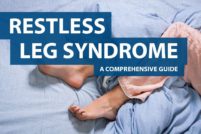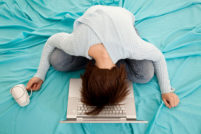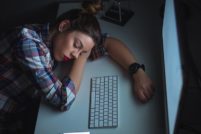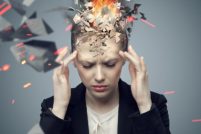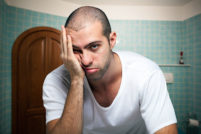Do you or your child have ADHD and are having difficulty getting enough sleep? Sleep problems and ADHD go hand-in-hand for many people. Whether it’s difficulty falling asleep, staying asleep or getting up in the morning, these issues can significantly impact your daily life.
What’s more, your lack of sleep might in turn be exacerbating your ADHD symptoms! We’ve put together this in-depth guide to explain why these issues happen and — more importantly — what you can do to help yourself get some much needed rest.
What is ADHD?
Attention Deficit Hyperactive Disorder (ADHD) is a mental condition that affects children, teenagers, and can also continue into adulthood.
As the name suggests, this disorder impacts your ability to direct your attention, and may also coincide with a need to remain active (hyperactivity). [1]How the disorder presents and what symptoms you or your child experience can vary a lot from person to person. Some are more affected by hyperactivity, while others struggle more with the attention-based side of the condition.

via www.brainbalancecenters.com
Is It ADHD? Helpful Tips To Identify The Disorder In Yourself Or Your Child
If you or your child are having problems sleeping it’s a good idea to explore whether or not ADHD is the cause. If the following symptoms are present alongside your sleep issues, you should bring up the possibility of ADHD with your doctor.
The 3 Main Symptoms Of ADHD
1. Inattention
- checkDifficulty paying attention and/or following directions
- checkForgetfulness and disorganization
- checkEasily distracted, often “daydreaming”
2. Hyperactivity
- checkTrouble sitting still, fidgeting
- checkRestlessness and/or agitation
- checkDescribed as “always on the go”
3. Impulsivity
- checkDifficulty waiting
- checkOften interrupts others
- checkQuick temper
However, these symptoms present differently depending on the person’s age. While children may be prone to running around and yelling, teenagers and adults may struggle with more subtle variations of these issues. [2]
Deep Dive: Want to test yourself for ADHD?
ADHD tests typically have two parts: one that focuses on distractibility, and a second to assess hyperactivity. Depending on your score on both sections you can get an idea of whether or not you have ADHD, and which type.
- Children
- Adults
Inattention
- My child has trouble focusing on tasks or play activities.
- My child often makes careless mistakes on schoolwork or other activities.
- My child often does not follow instructions or fails to complete tasks.
- My child rarely completes an activity before moving to the next activity.
- My child often doesn’t seem to listen, even when spoken to directly.
- My child is disorganized, even when provided with help.
- My child often loses or misplaces things, such as toys, homework assignments,
- and school supplies.
- My child tries to avoid activities or does them grudgingly when they require
- sustained concentration and a lot of mental effort.
- My child is forgetful.
- My child is easily distracted.
- My child avoids activities that require extended periods of concentration (e.g. homework).
Hyperactivity
- My child is always “on the go.”
- My child always fidgets or squirms when seated.
- My child often gets up from his/her seat, even when being seated is expected.
- My child talks excessively.
- My child has difficulty engaging in quiet activities.
- My child blurts out answers at school and at home, even before the question has been finished.
- My child has difficulty waiting his/her turn.
- My child often interrupts others.
Inattention
- I often make careless mistakes in my work (e.g. typos, wrong dates).
- I have difficulty focusing on longer tasks, even leisure activities.
- I am easily distracted during long conversations.
- I prefer to jump right into an activity without reading the instructions.
- I have difficulty organizing my work, social life and other daily tasks.
- I struggle to finish tasks that require focus for a long period of time.
- At other times I feel “hyper-focused.”
- I often lose/misplace things or lose track of what I was doing.
- My home/workspace is cluttered.
Hyperactivity
- I fidget when seated for long periods of time.
- I walk faster than other people.
- I have to take frequent breaks from activities that require being seated due to agitation.
- I grow impatient/agitated when things are very quiet.
- I often feel rushed, even when something isn’t urgent.
- I have difficulty relaxing or working quietly.
- People often describe me as being “always on the go.”
- I have a lot to say, but I am not a great listener.
- I enthusiastically agree to take on new challenges, then become overwhelmed.
If answered yes to 5 or more questions on on one or both of these questionnaires, set up an appointment with a specialist for a full assessment.
7 Ways ADHD Interferes With Your Sleep
When we take an in-depth look at the physical and psychological manifestations of ADHD, the way that these interfere with your sleep becomes clear.
Individuals with ADHD struggle with issues related to alertness and arousal that permeate every aspect of their life — including sleep. [3]
1. Lack of focus
ADHD can cause you to have trouble focusing. You may find that you’re easily distracted and find an endless list of activities that grab your attention away from the task at hand: Going to bed.
2. Trouble disengaging from activities
Many people with ADHD have trouble disengaging from an activity without the intervention of some external force.
This means that you can easily lose yourself in an activity, and this hyperfocus can cause you to completely lose track of time and stay up way past your intended bedtime.
3. Poor sense of time
People with ADHD often exhibit poor time management. It’s not simply that you’re procrastinating, but you may simply not have the same internal sense of time that other people do.
You could find yourself surprised to find you’ve spent an hour completing your evening tasks, as it only felt like a few minutes had passed.
4. Enjoy quiet of late evening
You also may be staying up late intentionally: Adults with ADHD often find that their focus improves in the evening, and thus take the opportunity to complete work and other tasks leftover from the day.
Many people with ADHD describe themselves as night owls, and it simply feels unnatural to head to bed early.
5. Mental and physical restlessness
Do you have difficulty “shutting off” at the end of the day? Physical restlessness and anxiety are common symptoms of ADHD and there’s no doubt that they make falling asleep a difficult task.
You may lie down to sleep only to toss and turn, or be overcome by ruminating thoughts or worries.
6. Mood swings and low stress tolerance
You may find that mood swings interfere with your ability to relax in the evening.
Additionally, many people with ADHD have difficulty coping with daily life stressors. Both of these symptoms can exacerbate anxiety and physical restlessness in the evening.
7. Stimulant medications
Many of the medications prescribed to treat your daytime symptoms are stimulants. Depending on how you personally react to these medications, you may find that they inhibit your ability to shut down when night falls.
Additionally, children with ADHD are more likely to experience sensory processing or sensory integration deficits.
This comorbid disorder can lead to even greater difficulty getting comfortable in bed, as small disturbances — such as an ill-placed tag in a pajama top, or sudden noises outside their bedroom — can prevent them from entering the restorative stages of sleep. [4]
How Sleep Deprivation Impacts ADHD
It’s not just ADHD that can impact your sleep: Sleep deprivation can exacerbate — and in some instances even be the cause of — your ADHD symptoms.
Therefore, treating sleep issues can actually help improve your condition and in conjunction your quality of life. [5]
You are probably getting a sense of how these two factors feed into each other to create a vicious cycle if left to their own devices.
Interestingly, there is a lot of overlap between the symptoms of ADHD and those of sleep deprivation. This is especially true in young children who respond to exhaustion with a paradoxical surge in energy levels.
And it doesn’t take much to have this effect: Even if you are sleeping but the sleep you are getting is poor quality, it will still have a noticeable impact on your ability to concentrate and levels of energy, agitation and impulsivity. [6]
For this reason, it can at times be difficult to determine whether sleep problems are the cause or the result of ADHD. Putting aside the issue of misdiagnosis, the good news is that treating these sleep problems is beneficial for everyone.
Types Of Sleep Disorders Associated With ADHD
ADHD has been linked to many different sleep related issues. Research has shown that the following sleep disorders are far more prevalent among those with ADHD than those without: [7]
Insomnia
As many as ¾ of adults with ADHD report experiencing initiation insomnia caused by an inability to simply shut off their minds.
Insomnia is a difficulty falling asleep or staying asleep, and is by far the most common sleep disorder experienced by both children and adults with ADHD.
As many as ¾ of adults with ADHD report experiencing initiation insomnia caused by an inability to simply shut off their minds in order to sleep. [8]
But it’s not just getting to sleep: You may also find that once you fall asleep you remain restless. Tossing and turning and waking up frequently is another form of insomnia that plagues those with ADHD.
Hypersomnia
Hypersomnia, or excessive daytime sleepiness, can be thought of as the opposite of insomnia. While people with ADHD often have a hard time getting to sleep at night, during the day you may be overcome by the desire to sleep.
This is likely to be the result of sleep deprivation catching up to you and intruding on waking hours. [9]
Sleep Disordered Breathing
Sleep disordered breathing has been linked with ADHD — with nearly 50% of children with ADHD exhibiting signs of these disorders. [10] However, whether ADHD causes breathing issues or these nighttime problems result in ADHD symptoms is unknown.
Nearly 50% of children with ADHD exhibiting signs of sleep disordered breathing.
Sleep disordered breathing includes both simple snoring and a more serious condition called sleep apnea. In sleep apnea, the individual actual has pauses in their breathing while sleep. This can cause blood oxygen levels to drop, prompting the person to wake up.
Circadian Rhythm Disorders
One suspected cause for why individuals with ADHD have difficulty keeping time is that their internal clock — known as circadian rhythm — is disrupted.[11] Some people with ADHD exhibit signs of circadian rhythm disorders, particularly delayed sleep phase syndrome (DSPS).
Having DSPS basically means that your internal clock has shifted forwards from the natural day/night schedule. This explains why many people with ADHD identify as night owls, and also why you might struggle to wake up in the morning.
Parasomnias
Any undesired behavior or experience that arises while you’re sleeping falls under the umbrella term parasomnia. Their prevalence among people with ADHD is suspected to be caused by disturbances in rapid eye movement sleep. [12]
The most common parasomnias experienced by people with ADHD include:
- Restless legs syndromeAs the name implies, restless legs syndrome causes you to feel unpleasant or uncomfortable feelings in your legs, along with an irresistible urge to move them. While categorized as a parasomnia, restless legs syndrome isn’t reserved to while you’re in bed: sufferers may experience the symptoms at any point when they are resting.
- BedwettingChildren with ADHD are three times more likely to experience bedwetting, and this parasomnia may also persist into adulthood. While the link between ADHD and bedwetting is not yet well defined, both disorders are caused by a disruption in the central nervous system.
- NightmaresStudies have shown that people with ADHD struggle with frequent nightmares. What’s more, an analysis of dream content revealed that these individuals are more likely to have negative dreams: featuring threats, misfortunes, physical aggression and bad endings.
12 Tips To Sleep Better With ADHD

1. Stick to a set sleep-wake schedule
One of the most powerful changes you can make to improve your sleep is also one of the hardest for people with ADHD.
Sticking to a set sleep-wake schedule — even on the weekends and days when you could get away with late nights and late rises — will help train your body and mind to shut down and turn on at more reasonable times of day.
2. Structure your bedtime routine
Next you’ll want to work on structuring your bedtime routine. This means devoting a window of time to unwind, relax and prepare yourself for sleep.
You should include one or more relaxing rituals in this routine, such as taking a bath, sipping a cup of (decaf) tea, or meditating.
3. Avoid stimulating activities in the evening
Even before you begin your bedtime routine you’ll want to avoid stimulating activities in the evening — this includes TV, certain kinds of music and video games.
While many of these activities may feel passive, they can be both emotionally and physically arousing, which means you’ll have to work extra hard to relax during your bedtime routine.
4. Get the right kinds of light exposure
Light is the most powerful cue your body uses to regulate your internal clock and sleep-wake schedule. So, by exposing yourself to light at the right times of day and avoiding it at others you can send your body messages about whether it should feel sleepy or awake.
If you have trouble waking up in the morning and suffer from feelings of grogginess and brain fog, make sure you get a good dose of light first thing upon awakening. And do the opposite when it’s approaching bedtime and you find you’re not tired: dim the lights!
You can also install sunrise/sunset simulating lights in your home that gradually dim and brighter to mimic natural lighting and have been proven to help in the treatment of circadian rhythm disorders.
5. Avoid screens in the evening
While this falls under light exposure, it has such a huge impact on your sleep that it deserves it’s own section. The screens of all our favorite electronic devices (TVs, smartphones, computers) emit what is called blue light.
Numerous studies have shown that this light suppresses the production of the sleep hormone melatonin even more so than other forms of light — making it very hard to fall asleep.
If you absolutely must use your devices, putting them on night-mode will limit your exposure to the pesky wavelengths responsible for this effect. However, abstaining altogether is the best way to ensure there’s no interference with your sleep.
6. Avoid caffeine and alcohol late in the day
Caffeine actually remains active in your body for many hours after you finish your post-lunch latte. It’s best to avoid all sources of caffeine once it hits late afternoon: this includes soft drinks and chocolate — which can have significant levels of caffeine.
Alcohol is a little bit of a more complicated story. While alcohol is sedating, and thus can help you fall asleep faster, it actually inhibits the more restful stages of sleep and can cause you to awaken frequently throughout the second half of the night.
7. Reserve your bed for sleep and intimacy
Many of us have habits of sitting in bed watching TV, working on laptops or chatting on our smartphones. Sleep experts agree that this is one surefire way to set yourself up for failure when it’s time to tuck in for the night.
By reserving your bed for sleep and intimacy only, it trains your body and mind to be prepared for sleep once you get under the covers.
8. Exercise regularly
Exercise is part of any healthy lifestyle, but if you schedule in the right type of workout at the optimal time of day you can also increase your chances of having a good night’s sleep.
Thirty minutes of aerobic exercise (such as walking, biking or swimming) done in the late afternoon (approximately 5 hours before bedtime) has been proven to help you fall asleep faster and sleep deeper. [13]
Following all these guidelines may not be sufficient to help you get a good night’s rest if your bedroom environment is working against you. There are also certain tips you can apply to create the ideal space for sleep:
9. Use a white noise machine
If you’re easily disturbed by environmental noises while you sleep, use a white noise machine (or app!) to drown out those bumps in the night.
White noise works by lowering the difference between these sudden auditory intrusions and the ambient noise in your bedroom so that they’re less likely to awaken you.
Other people find that white noise has a comforting and calming effect that helps them quiet their mind so that they can fall asleep.
10. Lower the temperature
Even if your bedroom isn’t particularly hot, you might benefit from turning down the thermostat a few degrees.
Research shows that temperatures between 60 and 67 degrees Fahrenheit (15.5 – 19 degrees Celsius) help you to fall asleep and sleep more comfortably throughout the night.
However, you also don’t want it to be too chilly either! If you find your feet get cold very easily, wear socks to bed or sleep with a hot water bottle by your feet.
11. Upgrade your mattress
Your mattress is one of the most important pieces of furniture in your home — if not the most important! It’s important to ensure that your sleep surface is both comfortable yet adequately supports your body throughout the night.
Also, if you’ve been sleeping on the same mattress for the past decade, it’s probably time to replace it. Experts recommend you upgrade your mattress every 7 years.
Many people are shocked by how much their sleep is improved by simply purchasing a new mattress that meets their individual needs.
12. Change your color scheme
Color can have a significant impact on our mood and energy levels. Bold warm tones like reds can make us feel anxious and even cause your blood pressure to rise! In contrast, soft cool tones promote a sensation of calm and relaxation.
A survey conducted by Travelodge showed that people who sleep in blue rooms fall asleep faster and sleep longer than those who don’t. However, you don’t have to go out and buy blue paint — simply ensure that your bedroom colors instill in you a sense of serenity.
Medical Treatments For Sleep Disorders In ADHD
If lifestyle changes are unsuccessful, you should discuss medical treatment options with your doctor. You may be prescribed a medication to help with your sleep, or your doctor might alter your ADHD medications to address your concerns.
Stimulant ADHD Medication
The most common medications used to treat ADHD are stimulants, such as Ritalin and Adderall. These drugs can be active in your system for anywhere from 4 to 12 hours, and one of their primary side-effect insomnia. [14]
In the majority of patients with ADHD stimulants have a paradoxical calming effect. Thus, it might not be the medication itself causing your insomnia but rather when you’re taking it.
Your doctor might recommend that you take a dose of your medication 45 minutes before bed to help with feelings of restlessness.
If you have difficulty waking up in the morning, your doctor might recommend a two-alarm approach: Set an alarm 45 minutes to an hour before you need to get up and at this time take your dosage of stimulant medications.
Then, when the second alarm sounds to indicate it’s time to get out of bed the medication will be active in your system making it a lot easier to do so.

For some people the stimulant medications they take for their ADHD do interfere with their ability to sleep — no matter when they’re taken. In these cases your doctor might recommend another medication to help you fall asleep.
Melatonin
The sleep hormone melatonin is available as a supplement at most pharmacies and health food stores. Unlike most sleep medications, melatonin is not a sedative but rather signals to your body that it’s time to go to sleep.
Taking a melatonin supplement in the evening can also help treat circadian rhythm disorders by gently nudging your biological clock back into sync with a normal day-night schedule.
Antihistamines
Antihistamines are typically used to treat allergies; however, since many of them cause drowsiness they are a safe, non-habit forming option to treat sleep disturbances.
Benadryl is a available over-the-counter antihistamine that can be taken 20-30 minutes before bed to help induce sleep. This medication is very long-lasting and therefore can make getting up in the morning very difficult.
People with ADHD also need to be cautious as approximately 10% of patients will experience paradoxical agitation in response to this medication.
Periactin is a prescription antihistamine that works very similarly to benadryl. It carries the same risk for daytime sleepiness and unwanted agitation as well.
This mediation can also help to suppress dreams and counteract the appetite-suppression of ADHD stimulant medications, which makes it very useful in certain cases.
Clonidine
Clonidine is a prescription medications typically prescribed for high blood pressure, but is also commonly used to treat hyperactivity in ADHD patients. A low dose of this medication has a sedating effect that can help you fall asleep.
Antidepressants (Trazodone)
Certain antidepressants like Trazodone are often used in the treatment of insomnia because they have a sedating effect but are non-habit forming. Studies have shown the medication to be effective in both helping patients fall asleep faster, as well as reducing nighttime awakenings.
Tools & Resources to Help You Sleep
We’ve put together a list of applications and resources to give you a helping hand in tackling both your sleep issues and your ADHD.
Applications
These days you have access to many amazing tools at the touch of a screen: These applications available for most devices are designed to help people like you get better quality sleep.
White Noise App by TMSOFT

It’s no longer necessary to go out and buy a special white noise machine when you can simply download the White Noise app from TMSOFT.
Choose from a large variety of looped audio clips, including air conditioner, rain and ocean waves. This app also features an alarm clock which slowly fades in to wake you gently.
Calm.com

If you’re interested in exploring relaxation techniques to help you fall asleep, Calm is a great place to start.
This app gives you access to guided meditations, breathing exercises, sleep stories and visual content — all created to encourage you to relax and relieve anxiety and insomnia.
Sleep Cycle Alarm Clock

If you have a lot of difficulty waking up in the morning, you might want to try out this alarm clock that’s designed to make the process easier. Sleep Cycle Alarm Clock works by keeping track of what stage of sleep you’re in using your phone’s accelerometer.
It then times your alarm to occur during a lighter stage of sleep, which should leave you feeling less groggy and disoriented.
Resources
The following links provide detailed information about many topics related to ADHD, as well as help seeking out medical care for your or your child’s condition.
American Academy of Child & Adolescent Psychiatry
CHADD The National Resource on ADHD
Attention Deficit Disorder Association

